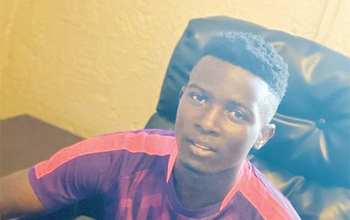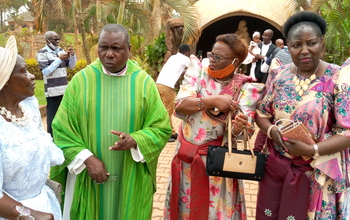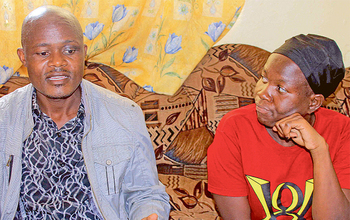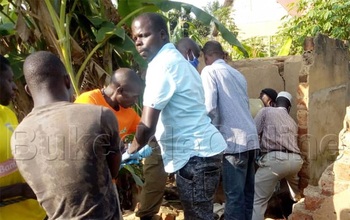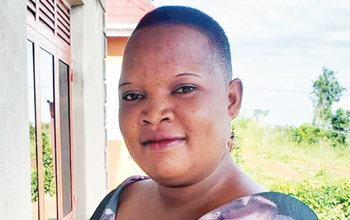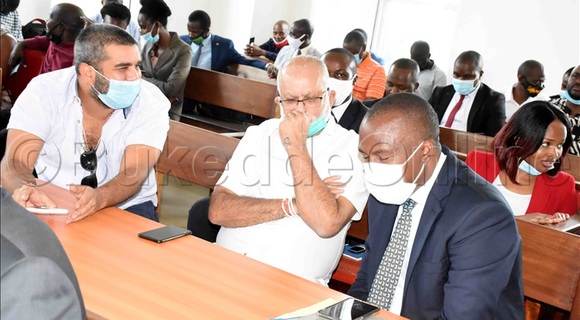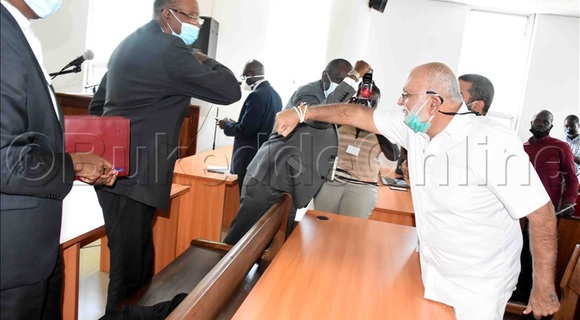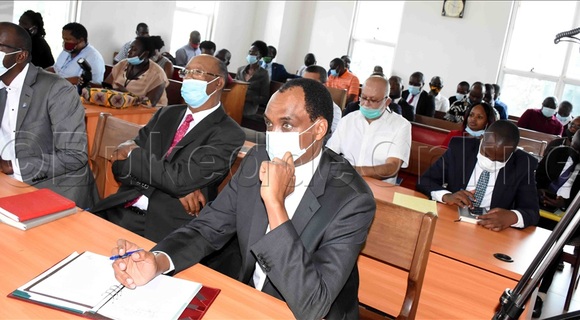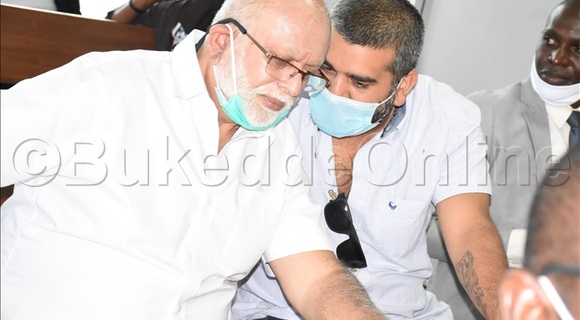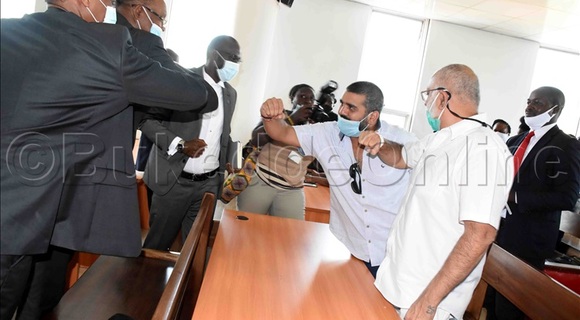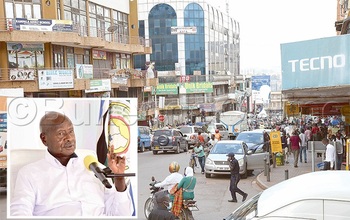
If the general environment doesn't allow the 2021 general election to take place, some other authority determines that.
It's parliament that has the legislative powers to determine that the situation is so dire for an election to take place, JUSTICE SIMON BYABAKAMA MUGENYI, the Electoral Commission chairman, told editors and political reporters during a meeting called to explain the hot-button issues dogging the highly controversial revised electoral roadmap, which have kicked up a political storm.
Justice Byabakama Mugenyi said EC is commanded by the current law to hold elections in the first 30 days of the last 122 days to the expiry of the term of office of the president, parliament or local government.
He said however, that the health risks posed by the outbreak of the coronavirus pandemic, forced EC to outlaw open air rallies in favour of digital campaigns – a proposal that has since drawn stiff resistance from the political opposition.
Baker Batte Lule recorded the exchange between Byabakama and journalists. Below is an bridged question and answer session.
There is contention that the revised roadmap lacks the legal framework…
When you talk about a revised something it means there is something that already existed but for some reasons you are revising it. The commission had started implementing some activities in the roadmap in a sequential manner because an election is not an event but a process.
But then Covid-19 came in and with the subsequent lockdown everything went into gridlock. Because of the period we were non-operational, and the time given in the constitution to organize the election was getting closer each day, we decided to come up with this revised roadmap.
But we decided to review the roadmap, which we had given primarily on the aspect of timelines but the activities remain the same. The only difference that has come in, is the terms of the campaigns. The issue of change from open air campaigns to media campaigns like we have indicated is backed by the law.
Section 12 of the Electoral Commission Act outlines the powers of the commission, which among others include ensuring that candidates campaign in an orderly and organized manner. The Presidential Elections Act Section 21 says that…the Commission may determine the manner and period during which campaigns shall take place…Therefore, whatever we are doing is grounded in the current legal framework.
Why didn't you consult before you rolled out this current roadmap?
The Constitution stipulates that in exercise of our duties we shall not be subject to control of any person or authority. When we were rolling out this roadmap in 2018, it was the handiwork of the Electoral Commission, when we are revising it; it's the work of the Electoral Commission.
But since we don't work alone, we are required to inform the political parties that bring us the candidates, which we have done. It's after we have informed them that we encourage them to raise any observations.
But secondly, you have been around for a while; look at the interparty and intraparty dynamics of our current political parties. They are not even generating consensus internally let alone the interparty attempts to generate consensus. If you as the commission start off by saying, before we do anything, let's start off with consulting various political parties.
You know, there are about 29 registered political parties; this would be opening the floodgate of to-and-fro movement. One step forward two steps backward, which might cause a derailment and a delay of the process. Those are the people who will tell you we first want to consult among ourselves and then comeback. Then another group will tell you we have to first take the proposal to the top management of our party; but time is not on our side. So in my view it was not necessary to consult other stakeholders.
Where did you copy this thing of scientific elections?
We have had a lot of benchmarking during this lockdown period. I think one of the countries is Benin, and then Burundi, but you saw what happened in Burundi, you want us to hold campaigns the Burundi way? Do we love ourselves and our children?
Before we came up with this stand on how campaigns are to be held, we first engaged scientists in the ministry of Health. We took them through our activities, which are crowd pullers, campaigns, nominations, but they were particularly concerned with the mass rallies; how do you enforce, social distancing and other SOPs (standard operating procedures) like hand washing?
They said if we do that, we shall make them collapse from pressure because that is a fertile ground for the virus to germinate. So we said an election doesn't only rotate around the campaign process. For voting we said, we are not yet at a stage of voting electronically. The only thing you can get electronically is accessing nomination forms, but you have to fill them and then submit them physically at the nomination centre.
But we are also saying appear only with the nominator and seconder. This business of general happiness on the roads is out. We are not trying to deny you support but we are trying to preserve our people. If we can tell you to stay at your home (during lockdown) and poor women to sleep in the market, our churches and mosques closed –was that for katemba (comedy)?
Really what do you want the Electoral Commission to have done? You hear people say how can the Electoral Commission deny us our right? Is there any right more than going to work to earn a living. The right to life is far superior than democracy; if you are deceased, which democratic right do you exercise?
Have you thought of having bizindaalo (mega speakers) because some places have no access to radio signals?
That's one of the things we are looking at. We even mentioned it to the ministry of Information because I remember there was an effort to ban them by Uganda Communication Commission.
When you are dealing with an emergency like Covid, you have to apply unusual methods of getting what you want. The minister said they're going to work with UCC and see whether they can allow them to operate.
Why did you consult only the president?
We met the president as the commission but we went in broad daylight. Our primary reason to see him was money. You know we are supposed to move out of this place (our head office on Jinja road) by July next year [To allow for the construction of the Jinja Express Highway] but the ministry of Finance has never given us money to get the home we want.
So, we felt we need to make a final appeal to the president because he's the substantive minister of finance. We went to see him for that and also other issues of finance to do with the elections. When we talked to him about the elections, he said his main concern was the lives of the people. We told him about Article 61 of the constitution that commands us to organize elections whether we have Covid or not.
We indicated to the President that this article must be adhered to, with Covid or no Covid. He said in that case therefore why don't we engage the scientists to guide us. So we went to see the minister of Health. So we didn't go to consult the president as a candidate but as a president of the country who meets all manner of people. So these people who want to make a sour meal out of our meeting with the president, temuli; there is nothing.
What do you say about the High court ruling directing you to allow prisoners and people in the diaspora to vote?
I'm waiting to look at that ruling, study it as a commission and map a way forward. We shall inform you when a decision is made.
The bulk of the radio stations are owned by incumbent politicians, how are you going to make sure their opponents also get an opportunity to use them?
We are going to engage media associations like the National Association of Broadcasters, UCC, UJA, among others. This shift has been brought about by Covid and all of us have to be part of the process.
Even you radio owners, what's wrong with your opponent coming to your radio after all he is paying? But in my view, I think we have the legal framework that supports us. By the way, many politicians always want to go to the radio. What do they go there for?
Some of them have been complaining that they have been chased away from the radio. In normal times, they want to go to the radio and now during Covid we are telling them go to the radios and they are saying no. eeeh, what's this?
You said the Constitution commands you to organize elections in the first 30 days of the last 122 days to the expiry of the term of the president but the circumstances on the ground don't allow you to have such elections, instead of pushing ahead with these scientific elections, why don't you ask the MPs to amend the law?
The command under 61 doesn't give the commission an option to say we are unable to obey, it doesn't. When you use the term shall, it's a command, irrespective of the circumstances. For one reason or another, if the general environment doesn't allow an election to take place, some other authority determines that.
It's parliament that has powers to determine that the situation prevents the election from taking place. We are not supposed to lobby; it's not our duty because parliament is based here in Uganda. It's not in the powers of the commission to determine whether we are in a state of war or emergency, we don't have that capacity. For us, we only organize elections.
Whether Covid amounts to a state of emergency it's not for the commission to decide. That's why we are saying that even if we had six months remaining, we must move forward if we don't, we shall be plunging the country into a constitutional crisis. That's why we are saying that Covid or no Covid, we are going ahead with the elections until other person tells us stop.
Presidential and Parliamentary Elections are held on the same day, given the number of candidates' agents, won't this work against the measures of social distancing?
Unlike other polling stations in developed countries which are inside buildings, ours are in play grounds where you can distance yourself as much as possible.
The only challenge is in urban places like Kampala where we don't have open spaces. But these are challenges that are peculiar that's why we say maybe, we shall have to work with schools to conduct elections if Covid is still a challenge next year. But if it goes away, we shall go back to our normal campaigns.
The Presidential Elections Act, which gives you the power to determine the manner and period when the campaigns are held is the very one that gives candidates the right to hold public campaigns. So under which law are you going to outlaw them?
But the Electoral Commission Act says we have the mandate of making sure that campaigns are held in an orderly and organized manner and we are saying in light of Covid, mass campaigns might not be orderly and secondly it's us to determine the manner.
So don't read the law in isolation. So when the regulator says the campaigns are through the media, why would you say no; are you the regulator?
Are you considering amending the law to allow for two day voting because social distance rules might make it hard for all the people to vote?
Polling stations open at 7 am assuming all factors remain constant. Whoever is at the polling station by 4 oclock is allowed to cast his or her vote. Even if there are 500 people in line by 4 pm they will vote. Those who are not allowed to vote are those who come after 4pm even if they come 300 voters.
Therefore, the issue of social distancing will not interfere with the speed with which the voters will cast their vote by 4 pm because we are not talking about social distancing by one mile.
Source

